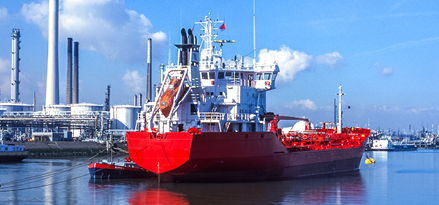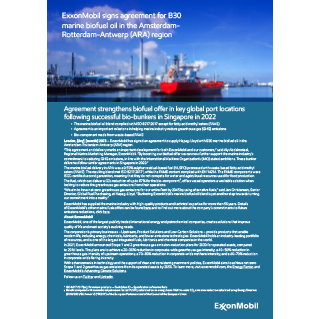

ExxonMobil signs agreement for B30 marine bio fuel oil in the Amsterdam-Rotterdam-Antwerp (ARA) region
Agreement strengthens biofuel offer in key global port locations following successful bio-bunkers in Singapore in 2022
- The marine bio fuel oil blend complied with ISO 8217:2017 except for fatty acid methyl esters (FAME)
- Agreement is an important milestone in helping marine industry reduce greenhouse gas (GHG) emissions
- Bio-component made from waste-based FAME
London, 25 May 2023 – ExxonMobil has signed an agreement to supply Hapag-Lloyd with B30 marine bio fuel oil in the Amsterdam-Rotterdam-Antwerp (ARA) region.
“This agreement and delivery marks an important development for both ExxonMobil and our customers,” said Aly Abdelmotaal, Regional Marine Marketing Manager, ExxonMobil. “By boosting our biofuel offer we can now further support the marine industry’s commitment to reducing GHG emissions, in line with the International Maritime Organization’s (IMO) stated ambitions. These bunker deliveries follow similar agreements in Singapore in 2022.”
The marine biofuel delivery in ARA was a 0.50% sulphur residual-based fuel (VLSFO) processed with waste-based fatty acid methyl esters (FAME). The resulting blend met ISO 8217:2017[1], while the FAME content complied with EN 14214[2]. The FAME components were ISCC-certified 2nd generation, meaning that they do not compete for water and agricultural resources used for food production. The fuel offers vessel operators a workable solution when looking to reduce the greenhouse gas emissions from their operations.
“We aim to have net-zero greenhouse gas emissions for our entire fleet by 2045 by using alternative fuels,” said Jan Christensen, Senior Director, Global Fuel Purchasing, at Hapag-Lloyd. “Bunkering ExxonMobil’s marine bio fuel oil blend is yet another step towards turning our commitment into a reality.”
ExxonMobil has supplied the marine industry with high quality products and technical expertise for more than 50 years. Details of ExxonMobil’s other marine fuels offers can be found here and to find out more about the company’s commitments to future emissions reductions, click here.
About ExxonMobil
ExxonMobil, one of the largest publicly traded international energy and petrochemical companies, creates solutions that improve quality of life and meet society’s evolving needs.
The corporation’s primary businesses – Upstream, Product Solutions and Low Carbon Solutions – provide products that enable modern life, including energy, chemicals, lubricants, and lower-emissions technologies. ExxonMobil holds an industry-leading portfolio of resources, and is one of the largest integrated fuels, lubricants and chemical companies in the world.
In 2021, ExxonMobil announced Scope 1 and 2 greenhouse gas emission-reduction plans for 2030 for operated assets, compared to 2016 levels. The plans are to achieve a 20-30% reduction in corporate-wide greenhouse gas intensity; a 40-50% reduction in greenhouse gas intensity of upstream operations; a 70-80% reduction in corporate-wide methane intensity; and a 60-70% reduction in corporate-wide flaring intensity.
With advancements in technology and the support of clear and consistent government policies, ExxonMobil aims to achieve net-zero Scope 1 and 2 greenhouse gas emissions from its operated assets by 2050. To learn more, visit exxonmobil.com, the Energy Factor, and ExxonMobil’s Advancing Climate Solutions.
Follow us on Twitter and LinkedIn.
1 ISO 8217:2017(en), Petroleum products — Fuels (class F) — Specifications of marine fuels.
2 EN 14214, Liquid petroleum products — Fatty acid methyl esters (FAME) for use in diesel engines and heating applications — Requirements and test methods.